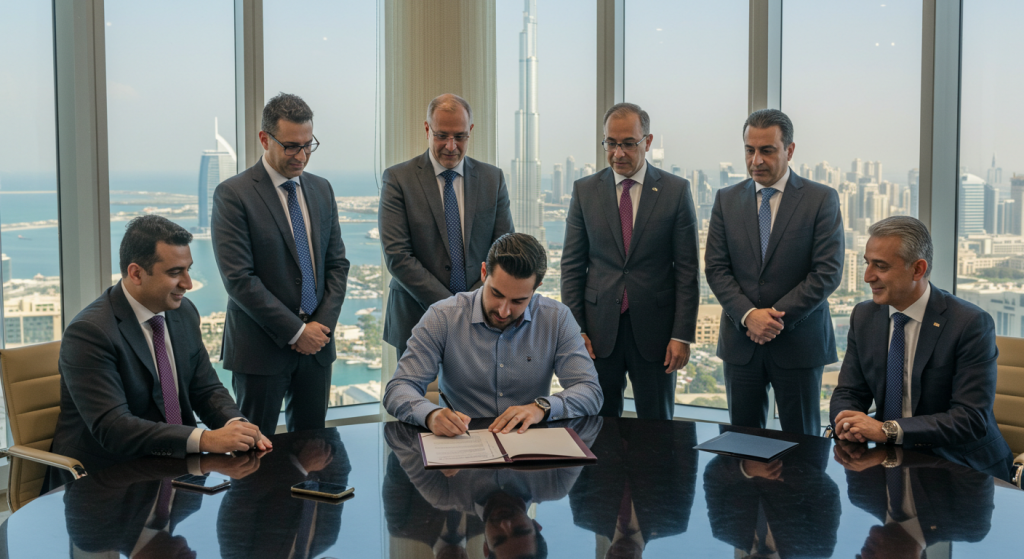Table of Contents
End-of-Service Benefits in Dubai: A Comprehensive Guide
End-of-service benefits (EOSB), commonly known as gratuity, are a crucial aspect of employment law in Dubai and the broader United Arab Emirates (UAE). These benefits provide a financial safety net for employees upon the termination of their employment contracts and are mandated by the UAE Labour Law. This comprehensive guide delves into the intricacies of EOSB in Dubai, covering eligibility criteria, calculation methods, and key considerations for both employers and employees.
Understanding End-of-Service Benefits in Dubai
EOSB in Dubai are governed by the UAE Federal Labour Law and are designed to compensate employees for their service and provide financial support during their transition to new employment or retirement1. These benefits are typically paid as a lump sum and are calculated based on the employee’s basic salary and length of service3.

It’s important to note that EOSB in Dubai apply only to full-time employees working in mainland Dubai and certain free zones3. UAE and GCC nationals are not entitled to EOSB. Instead, they are enrolled in pension schemes3. Emirati nationals must be registered under a pension scheme with the General Pensions and Social Security Authority (GPSSA) in Dubai or the Abu Dhabi Pension Fund (ADPF) in Abu Dhabi. Similarly, GCC nationals working in the UAE must be registered under a pension scheme with GPSSA, regardless of the Emirate in which they are employed.
Furthermore, the Dubai International Financial Centre (DIFC) has its own system for end-of-service benefits. The DIFC has replaced the traditional gratuity system with the DIFC Employee Workplace Savings (DEWS) scheme4. DEWS offers employees the option to invest their end-of-service benefits in a savings account, providing more flexibility and control over their funds.
Eligibility for End-of-Service Benefits
To be eligible for EOSB in Dubai, employees must meet certain criteria:
- Minimum Service Requirement: Employees must have completed at least one year of continuous service with their employer5.
- Employment Type: EOSB primarily applies to full-time employees. Part-time, temporary, or contract-based employees may not be eligible unless specified in their contracts2.
- Reason for Termination: Employees are generally entitled to gratuity regardless of whether they resign or are terminated, except in cases of gross misconduct as outlined in Article 44 of the UAE Labour Law5.
Calculating End-of-Service Benefits
The calculation of EOSB in Dubai is based on the employee’s last drawn basic salary and their length of service3. Allowances, such as housing or transportation, are not included in the calculation5. Any days taken off by the employee on unpaid leave are deducted from the length of service4. The following formulas apply:
- For employees with 1 to 5 years of service: 21 days of basic salary for each year of service6.
- For employees with more than 5 years of service: 21 days of basic salary for the first five years and 30 days of basic salary for each subsequent year6.
The total gratuity amount cannot exceed two years’ worth of the employee’s basic salary4.
To illustrate this calculation, consider the following table:
| Years of Service | Calculation |
|---|---|
| 1 to 5 years | 21 days of basic salary x years of service |
| More than 5 years | (21 days of basic salary x 5 years) + (30 days of basic salary x (years of service – 5)) |

Example:
An employee with a basic salary of AED 10,000 and 7 years of service would receive the following:
- For the first 5 years: AED 333.33 (daily salary) x 21 days x 5 years = AED 35,000
- For the remaining 2 years: AED 333.33 (daily salary) x 30 days x 2 years = AED 20,000
- Total EOSB: AED 35,000 + AED 20,000 = AED 55,000 3
End-of-Service Benefits for Alternative Work Patterns
Employees working part-time, on temporary contracts, or with flexible work arrangements are also eligible for EOSB in Dubai3. Their gratuity is calculated on a pro-rata basis, considering their working hours compared to a standard full-time schedule3.
To calculate the pro-rata percentage, the number of working hours in the employee’s contract per year is divided by the standard number of full-time working hours per year (2,080 hours). This percentage is then applied to the EOSB amount that a full-time employee would receive for the same duration of service3.
Additional Entitlements
In addition to gratuity, employees in Dubai are entitled to other benefits upon the termination of their employment. These may include payment for unused annual leave, any outstanding salary payments, and other contractual allowances1. Employers are obligated to settle all dues within 14 days of the contract termination date.
Termination Scenarios and EOSB
While gross misconduct can lead to the forfeiture of EOSB, different termination scenarios can affect the calculation of benefits7. Here’s how gratuity is calculated in various situations:

- Resignation: Employees who resign after one year of continuous service are eligible for gratuity payments1. However, the amount may vary depending on their length of service and the type of contract7.
- Termination: If an employer terminates an employee’s contract, the employee is entitled to gratuity based on their completed years of service7.
- Redundancy: In cases of redundancy, employees may be entitled to additional compensation or extended notice periods as part of their end-of-service benefits1.
The Voluntary Savings Scheme
In October 2023, the UAE Ministry of Human Resources and Emiratisation (MoHRE) introduced a voluntary savings scheme as an alternative to the lump-sum EOSB payment3. This scheme allows employers to invest monthly end-of-service contributions in an authorized investment fund, potentially providing employees with investment returns upon completion of their service3.
Key features of this scheme include:
- Voluntary Participation: Both employers and employees can choose to participate in the scheme9.
- Employer Contributions: Employers handle subscription applications, preserve end-of-service entitlements, and discontinue the use of the previous gratuity system for participating employees9.
- Employee Contributions: Employees contribute a percentage of their basic salary to the scheme, with the option to make additional voluntary contributions9.
- Investment Options: The scheme offers various investment options, including Sharia-compliant funds, capital guarantee options, and risk-adjusted funds9.
This scheme offers potential benefits for both employers and employees. Employees may benefit from investment returns, while employers may experience a reduced risk of cash flow issues3. However, it’s crucial to understand the voluntary nature of the scheme and the different investment options available9.
Limited vs. Unlimited Contracts
It’s important to distinguish between limited and unlimited contracts when considering EOSB calculations, especially in cases of resignation7.
- Limited Contracts: These contracts have a fixed end date. Upon completion of the contract, employees are entitled to gratuity based on their length of service7.
- Unlimited Contracts: These contracts have no fixed end date and can be terminated with mutual consent or by providing a notice period7. Gratuity calculations for unlimited contracts vary based on the employee’s length of service at the time of resignation10. For instance, employees who resign before completing one year of service are not entitled to gratuity, while those with longer service periods receive a portion of their gratuity based on their tenure.
Key Considerations for Employers and Employees
Both employers and employees should be aware of the following:
- Review the Employment Contract: The employment contract should clearly outline the terms and conditions related to EOSB, including the calculation method, notice periods, and any additional entitlements1.
- Maintain Accurate Records: Employers must maintain comprehensive records of employee service, including employment dates, basic salary, and leave records, to ensure accurate EOSB calculations1. Employees should also keep copies of their contracts and salary certificates6.
- Communicate Clearly: Open communication between employers and employees is crucial to avoid disputes and ensure a smooth EOSB settlement process6.
- Seek Legal Advice if Needed: In case of uncertainties or disputes, seeking legal advice from a labor lawyer or contacting the relevant labor authorities can provide guidance and assistance6.
Dubai Labour Law and Gratuity
Federal Decree-Law No. 33 of 2021, also known as the Dubai Labour Law, establishes the legal framework for gratuity payments in Dubai2. This law ensures that eligible employees receive their entitled end-of-service benefits and outlines the processes for calculating and settling these payments. Article 51 of the Dubai Labour Law specifically addresses end-of-service gratuity, providing detailed information on eligibility and calculation methods2.
Navigating the complexities of end-of-service benefits can be challenging, especially when it comes to ensuring all necessary documentation is in order. This is where POAPRO, a trusted Online Private Notary Public in Dubai, can assist. POAPRO Dubai Power of Attorney
offers a range of services, including drafting and notarizing Powers of Attorney, which can be crucial in managing end-of-service settlements and ensuring a smooth transition for both employers and employees. Their expertise in legal documentation can provide peace of mind and facilitate a seamless process during this critical phase of employment.
Frequently Asked Questions (FAQs)
Here are some common questions about gratuity in Dubai:
1. How is gratuity calculated in Dubai?
Gratuity is calculated based on the employee’s last drawn basic salary and length of service6. For the first five years, employees receive 21 days’ salary for each year of service. After five years, they receive 30 days’ salary for each subsequent year6. The total gratuity cannot exceed two years’ worth of the employee’s basic salary5.
2. What happens if I resign before completing one year of service?
Generally, employees who resign before completing one year of service are not entitled to gratuity7. However, this may depend on the terms specified in the employment contract6.
Conclusion
End-of-service benefits are a vital component of employment law in Dubai, providing financial security for employees upon termination of their employment. This article has provided a comprehensive overview of EOSB in Dubai, covering eligibility criteria, calculation methods for different scenarios, including alternative work patterns, and the recently introduced voluntary savings scheme. It has also highlighted the importance of the Dubai Labour Law in regulating these benefits and ensuring fair treatment for both employers and employees. By understanding the key considerations and legal provisions surrounding EOSB, individuals and organizations can navigate the end-of-service process smoothly and transparently. For specific situations or further clarification, seeking professional advice from legal experts or labor authorities is always recommended.
For more information about legal in Dubai, visit Legal Dubai page..
Works cited
1. End of Service Benefits in the UAE: A Step-by-Step Guide, accessed February 11, 2025, https://www.middleeastbriefing.com/news/end-of-service-benefits-in-the-uae-a-step-by-step-guide/
2. End of Service Benefits Dubai 2025 – Rules & Calculations, accessed February 11, 2025, https://labourlawyerdubai.ae/blog/end-of-service-benefits-dubai/
3. End of Service Benefits in the UAE – A Complete Guide 2024 – The Sovereign Group, accessed February 11, 2025, https://www.sovereigngroup.com/news/news-and-views/end-of-service-benefits-in-the-uae-a-complete-guide-2024/
4. Comparison of New Law on UAE Gratuity with Previous Law – HLB HAMT, accessed February 11, 2025, https://hlbhamt.com/a-comparison-of-new-law-on-uae-gratuity-with-previous-law/
5. Gratuity Law In UAE | The Complete Guide, accessed February 11, 2025, https://uae-lawyers.ae/blog/gratuity-law-in-uae
6. End of Service Benefits UAE: Your Guide to Gratuity Law – Alpha Pro Partners, accessed February 11, 2025, https://www.alphapartners.co/blog/navigating-end-of-service-benefits-in-the-uae-a-comprehensive-guide
7. How to calculate employee gratuity in the UAE – Caterer Middle East, accessed February 11, 2025, https://www.caterermiddleeast.com/business/how-much-gratuity-pay-employees-uae
8. End of service benefits for workers in the private sector | The Official Portal of the UAE Government, accessed February 11, 2025, https://u.ae/en/information-and-services/jobs/employment-in-the-private-sector/end-of-service-benefits-for-employees-in-the-private-sector
9. End-of-Service Benefits and Voluntary Contributions in the UAE – eosb, accessed February 11, 2025, https://eosb.ae/end-of-service-benefits-and-voluntary-contributions-in-the-uae/
10. Gratuity Calculator Dubai: A Complete Guide for Employees – Darwinbox Blog, accessed February 11, 2025, https://blog.darwinbox.com/how-to-calculate-gratuity

